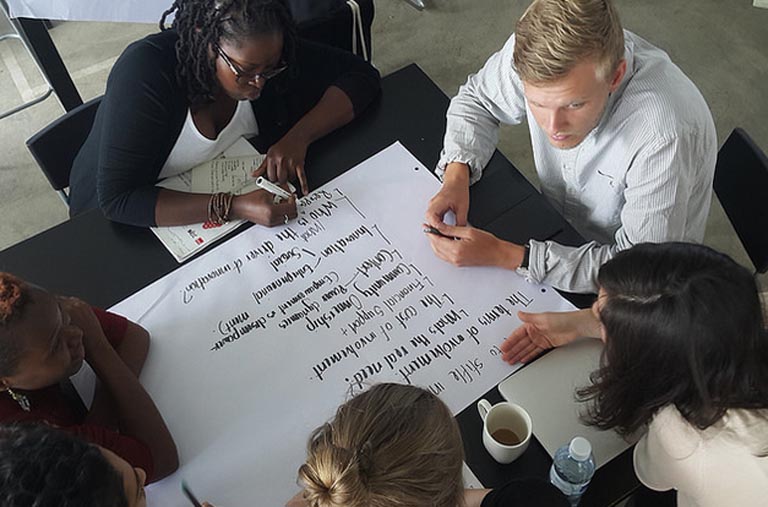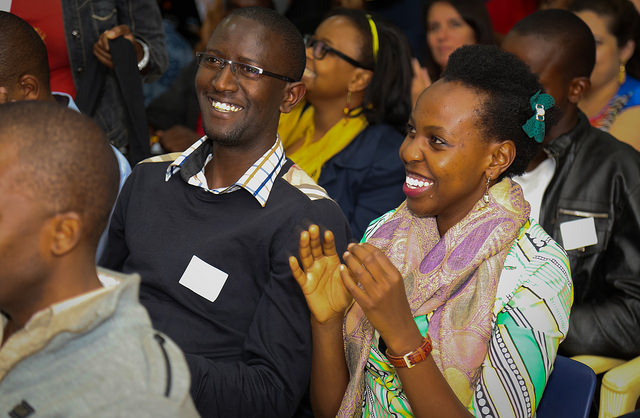Courtney Beale is the Senior Director for Global Engagement at the National Security Council. She spoke to 350 participants at the Global Entrepreneurship Summit’s Youth and Women Day in Nairobi about President Obama’s support for entrepreneurs around the world.
Here is her speech in full.
Hello! How is everyone doing? Are you all having fun?

It is incredible to be here with you today! On behalf of the White House, welcome to Women and Youth Day at GES. Thank you to everyone who has traveled from near and far to be with us today and make this possible, and to the Government of Kenya for co-hosting this incredible summit. I’m honored to speak to such an energetic and talented group of entrepreneurs. One of the best parts of my job is meeting with and speaking to groups like you because it reaffirms, every time, why it is so important for us to support your work.
This is especially true for youth. The UN estimates that worldwide, more than 500 million new jobs need to be created by 2020. In regions where the youth population is growing – 60 or 70 percent in some cases – entrepreneurship is an effective way to address high unemployment, provide alternatives to instability, and bring communities together. When President Obama came into office, he made advancing entrepreneurship a cornerstone of U.S. engagement around the world. He recognized that supporting entrepreneurs is one of the most powerful ways to create economic growth, social inclusion and resilient societies.
When we look at the world from the White House, we see big challenges: unemployment, instability, lack of education, health care deficits and food insecurity. But where people in government see problems, entrepreneurs like you see opportunities. Where others see market failure, you launch businesses, create organizations, and create jobs. When we look at you and your ventures, we see hope. We see young women and men using technology, the power of business, and a passion for social good to find innovative solutions to these challenges.
One example right here in Nairobi is Roshan Paul, the co-founder of the Amani Institute. Roshan is a visionary social entrepreneur from India. While working in the U.S. with nonprofit leaders around the world, he saw a market failure in the education sector that created a deficit of social sector leaders. He realized that there was a gap between traditional university programs and the practical skills necessary to combat global challenges. There was no medical school equivalent for the social sector. So Roshan created the Amani Institute to develop a low-cost, higher education, learning-by-doing model to develop next-generation talent to address social challenges.
And when he looked around the world at where to set up the Amani Institute, he decided to move to a city that is a hub of innovation and entrepreneurship. He came to Nairobi.

Three years later, the institute has trained over 650 students from 32 countries. The Amani Institute has been profiled in Fast Company and the Stanford Social Innovation Review. They have now expanded to set up another institute in Brazil. 90% of their income comes from business revenue. His 12 staff members are from 10 different countries, 60% women, and 90% under 35 years old. He hires women and youth because that’s where he finds talent. As Roshan says, “we don’t want people to have to choose between making a living and making a difference. You can and must try to do both.” Roshan saw a problem, created a business solution, and is employing women and youth to train the next generation of social sector leaders.
As this story illustrates, investing in entrepreneurs like you is a way to help solve big challenges in society. So for the last six years, the U.S. government has created hundreds of programs around the world to invest in people like you, and your good ideas to strengthen the next generation of entrepreneurs. As President Obama said a few months ago, “I believe that entrepreneurs like you can make the world a better place, one idea at a time. And you’re going to be how change happens — one person, one step, one business, one city, one country at a time.”
As we hear your stories today, we can see that change is happening. We are amazed by what you are accomplishing. Especially right here in Kenya and all around Africa.
 And we want to help you take it to the next step. We hope that the next few days will help you meet the right mentor or learn the skill you need to expand your enterprise, close that deal, and reach more people. We hope you’ll come away with a community of like-minded people who are invested, literally and figuratively, in your success. Usually when I speak to young people, my advice is not to wait. Don’t let society tell you to wait your turn, wait until you are older, or have more money, or more experience. If you have an idea, act on it. Now. But I have a feeling that if you’ve made it here today, you didn’t wait. You showed your community that you had what it takes. You had an idea and you acted. You shaped your own destiny. Because you are the dreamers and the doers. You all are the risk takers and the unwritten rule breakers. You are the activists and the connectors.
And we want to help you take it to the next step. We hope that the next few days will help you meet the right mentor or learn the skill you need to expand your enterprise, close that deal, and reach more people. We hope you’ll come away with a community of like-minded people who are invested, literally and figuratively, in your success. Usually when I speak to young people, my advice is not to wait. Don’t let society tell you to wait your turn, wait until you are older, or have more money, or more experience. If you have an idea, act on it. Now. But I have a feeling that if you’ve made it here today, you didn’t wait. You showed your community that you had what it takes. You had an idea and you acted. You shaped your own destiny. Because you are the dreamers and the doers. You all are the risk takers and the unwritten rule breakers. You are the activists and the connectors.
You are quickly becoming the role models and the mentors. The employers and the bosses. The inspirers and the leaders. You will be the person that can help someone younger or newer to entrepreneurship get ahead. I hope that you will take what you learn today and throughout GES and pass it on.
By working together and passing it on, we can all make more of an impact. It reminds me of the African proverb: If you want to go fast, go alone. If you want to far, go together. I think we can all agree that we have far to go to create the world we want to live in. But together, with the government, private sector, and entrepreneurs working as partners, we can go far. Together, passing on what we know and empowering more women and youth with good ideas, we can go far. So let’s all make the most of GES and let’s go far together.





 And we want to help you take it to the next step. We hope that the next few days will help you meet the right mentor or learn the skill you need to expand your enterprise, close that deal, and reach more people. We hope you’ll come away with a community of like-minded people who are invested, literally and figuratively, in your success. Usually when I speak to young people, my advice is not to wait. Don’t let society tell you to wait your turn, wait until you are older, or have more money, or more experience. If you have an idea, act on it. Now. But I have a feeling that if you’ve made it here today, you didn’t wait. You showed your community that you had what it takes. You had an idea and you acted. You shaped your own destiny. Because you are the dreamers and the doers. You all are the risk takers and the unwritten rule breakers. You are the activists and the connectors.
And we want to help you take it to the next step. We hope that the next few days will help you meet the right mentor or learn the skill you need to expand your enterprise, close that deal, and reach more people. We hope you’ll come away with a community of like-minded people who are invested, literally and figuratively, in your success. Usually when I speak to young people, my advice is not to wait. Don’t let society tell you to wait your turn, wait until you are older, or have more money, or more experience. If you have an idea, act on it. Now. But I have a feeling that if you’ve made it here today, you didn’t wait. You showed your community that you had what it takes. You had an idea and you acted. You shaped your own destiny. Because you are the dreamers and the doers. You all are the risk takers and the unwritten rule breakers. You are the activists and the connectors.
